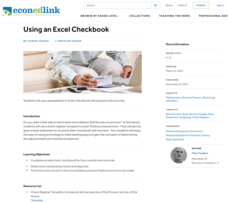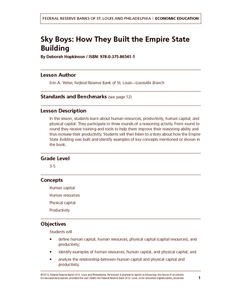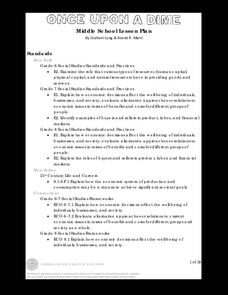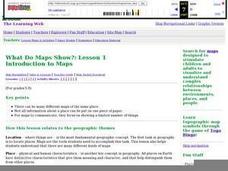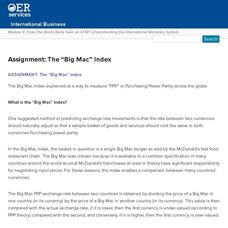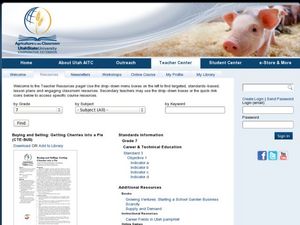Heritage Foundation
Congress's Economic Powers
Join Congress as they assess their economic abilities for spending—and as they discover their limits. High schoolers use an educational resource to explore Congress's economic powers and learn to apply these concepts to their everyday...
World History Digital Education Foundation, Inc.
COVID-19: Globalization and Economic Impact
How does COVID-19 affect a global economy? The final installment in a three-part series explores the economic impact of the illness on a global scale. High school historians discuss globalization and analyze sources of data to understand...
Historical Thinking Matters
Social Security: 5 Day Lesson
Did the New Deal fundamentally shift the role of the American government in the economy? Your class members will examine the interpretations of various historians in answering this question, and use a variety of primary and secondary...
Council for Economic Education
China - Where Will They Fit in the World Economy?
Teach scholars why China is so crucial to global economics through an informative resource. Activities include using databases to search for information, watching a video or listening to a podcast, and reading about China's economy as a...
National Endowment for the Humanities
People and Places in the North and South
North and South: two opposite directions and two opposite economic and social systems in time of the Civil War. Pupils peruse census websites and primary source photographs to understand what life was like for the everyday person before...
Council for Economic Education
Satisfaction Please! (Part 1)
The topic of consumerism seems easy to those who participate actively in the US economy, but pupils who are new to economics may see the idea as foreign. Help them understand their rights as consumers and what to expect when interacting...
Council for Economic Education
Production Possibilities Curve
Demonstrate the important economic principles of the production possibilities curve, including how to calculate opportunity cost and graph curves by using a table or calculation. Learners use a variety of methods, including videos,...
Council for Economic Education
Using an Excel Checkbook
High school is the time that many scholars get their first jobs. Help young entrepreneurs apply economic principles to crucial skills for their new jobs and for functioning in society in general. They use Excel to balance a checkbook by...
Federal Reserve Bank
Sky Boys: How They Built the Empire State Building
How tall is the Empire State Building? Lead your class through a collaborative estimation activity to determine the number of quarters it would take to reach the top and teach the following concepts: human capital, human resources,...
Federal Reserve Bank
Once Upon a Dime: Middle School Lesson Plan
Once Upon a Dime ... a group of middle schoolers wanted to learn about economics! Teach them complex economic concepts like supply and demand through a resource that effectively simplifies the explanations. Pupils work through various...
Federal Reserve Bank
Once Upon a Dime: High School Lesson Plan
Who knew that fairy tales and economics go hand-in-hand? Pupils complete a host of handouts, using everything from graphic organizers to short answer questions to reinforce concepts. They also complete a project that builds on everything...
Curated OER
What Do Maps Show?: Lesson 1 Introduction to Maps
Learners brainstorm a list of the different types of maps they have seen or used. Using the activity sheet, they look through a social studies book to find all the maps and to determine what they are used for. Using a poster, they review...
Facing History and Ourselves
The Weimar Republic: Historical Context and Decision Making
Did you know that way before Hitler became a dictator, he actually spent nine months in a German jail? Provide the background for the escalating point before the Nazi party took over in World War II through the exercises in the resource....
Curated OER
Economics Concepts
Students relate economics and government policies. In this lesson, students explore the relationship between economics and government policies. They understand how the economy works and can make better decisions as it relates to the future.
Curated OER
Central American Immigrants to the United States: Refugees from Unrest
Students identify the major aspects of Olmec and Mayan civilzations, including economic, political, and religious. They list contributions of these civilizations. Students identify the Central American countries where the United States...
Tidewater Community College
Assignment: The “Big Mac” Index
Young economists learn about the method of predicting changes in the exchange rate with Big Macs in an instructional video. After an understanding the index, learners write a post on a discussion board and respond to class members' posts...
Curated OER
Buying and Selling: Getting Cherries into a Pie
Kids keep score as they take on the roles of buyers and sellers in an agribusiness introduction. They play the game for five rounds, each round is made different by having a new economic element added, a discussion follows. Everything...
Stanford University
Pullman Strike
History is ironic, isn't it? In the Pullman strike, federal power thought to protect citizens was used to break the union. What started as a quest for better wages and benefits during an economic crisis was crushed through violence and...
Curated OER
You're In My Space!
Students explain how political, social, and economic boundaries can be changed through cooperation and conflict. Small groups are assigned a particular trouble area of the world. Each group studies a particular side of the conflict.
Federal Reserve Bank
The Story of the Federal Reserve: Middle School Lesson Plan
After reading the charming cartoon about the United States Federal Reserve, pupils often need to complete activities to retain their learning. The resource does a wonderful job of using class discussion and various written exercises to...
Council for Economic Education
Satisfaction Please! (Part 2)
Simply understanding consumer rights may not help people solve their problems. Understanding who to turn to becomes key in many different scenarios. Teach the value of various organizations that fight for consumer rights through...
Council for Economic Education
Satisfaction Please! (Part 3)
Understanding the US government's role proves very important in the American economy, especially for consumers. Scholars learn about how varying government agencies help them when facing an issue. The third and final resource in the...
National Endowment for the Humanities
The Matter of the Philippines
The United States won the Spanish-American War, so now what? Young scholars act as advisors to President McKinley and use primary sources to recommend what America should do with its territories. Using a variety of perspectives—including...
Curated OER
Lesson 6 How Does News Influence Stock Prices?
Students see that economic news and business events can change the price of a stock. They see that the unexpected events that benefit or harm the company, in turn, moves the company's stock price up or down.









